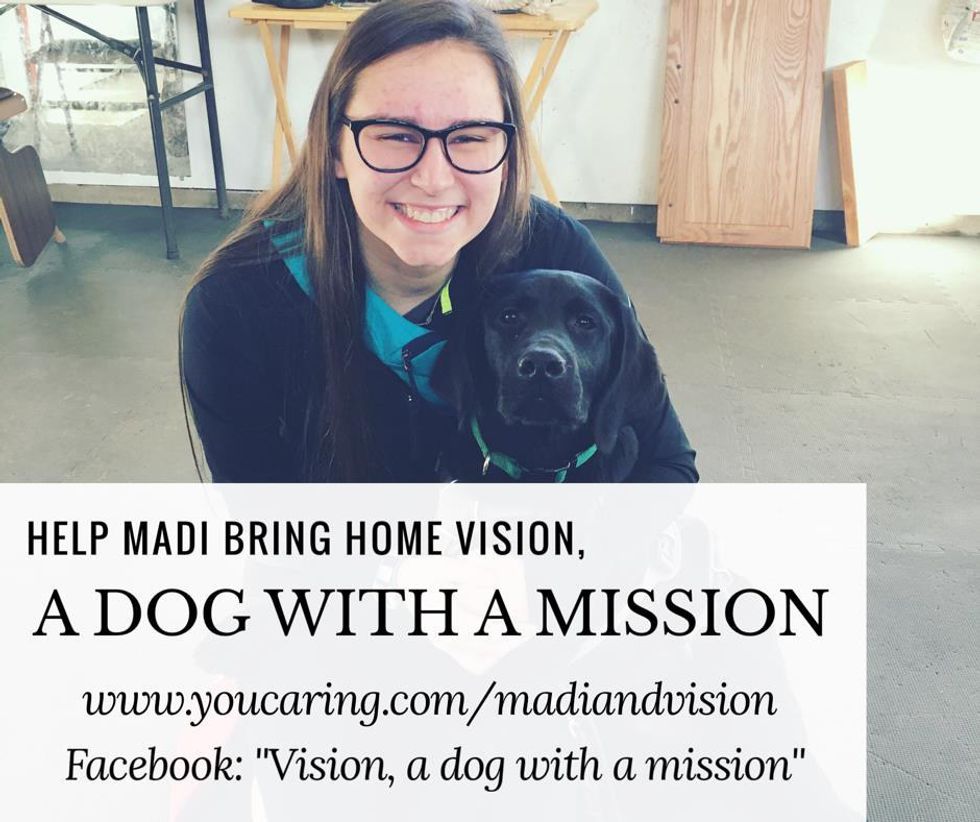Last year, I met Madi. Madi is a sophomore with me at the University of Puget Sound in Washington and is a sister of the Washington Gamma Chapter of Pi Beta Phi. When I first met Madi, I just saw a normal girl. Kind, funny, athletic, with beautiful long brown hair and a bright smile that you can see across campus. Madi is a hard worker, passionate, and that shown through when she told me her story.
Over the past year, Madi has become one of my best friends. We met through our campus' chapter of Intervarsity and continued our friendship through our Bible studies within the Greek community and Sunday morning drives to church together. Not to mention, the sleepovers and late night smoothie and milkshake runs we have had over the past semester! And through all of these times together, Madi told me her story piece by piece. Today, I am bringing that to you because Madi is getting ready to start a new chapter of her life and needs your help to continue it.Q: Tell me about your story.Madi: "10 years ago, I was diagnosed with Type 1 Diabetes. My mom noticed I was always drinking a lot of water and juice, going to the bathroom a lot, and was abnormally cranky, so she thought something must be wrong. She took me to the doctor because she was concerned and they found out I was type 1 diabetic. When the nurse was explaining my diagnosis to me, she mentioned the word "diabetes" and I immediately thought she meant I was going to die. It was all really scary. I was immediately admitted to the children's hospital where I learned how to take over all the work of my pancreas because my body has basically attacked it so that I can no longer produce any insulin. Doctors don't fully know why my body will no longer produce insulin, but there is nothing that I could have done to prevent it from happening. I was in the hospital for a few days and had to learn how to live as a person with Type 1 Diabetes: how to count my carbs, check my blood sugar, and give myself injections. From that moment, I knew it was going to change my life. My parents also had to learn how to manage my diabetes because I was so young and it is so unpredictable. My mom has told me it was like taking home a new baby because she would constantly have to be checking my blood sugar, even in the middle of the night to make sure that I was still alive. That to me is still one of the saddest parts about this, my mom had to literally check in the middle of the night to see if her eight-year-old was still breathing. And as the years went on, we learned how to manage it better. I went to diabetes camp one year and the director had a dog that was trained so that it could smell and alert for blood sugar changes. It was mind blowing to me that a dog, of all things, could do that. As soon as I came home, I was constantly talking about trying to get one of these amazing dogs, but we could never find the perfect program or dog for me. Going away to college was a huge step because I was going to be going on my own for the first time, without my parents to be able to keep checking in on me or make sure that I was doing ok. It was a huge leap of faith, especially for my parents to let me go out of state for college and be on my own. It is even more challenging because I am now completely responsible for managing the ups and downs of this disease by my self. My life relies on a continuous insulin pump and I always need to make sure I have all of my supplies, check my blood sugar, and make sure that people around me know about my condition and what to do in case anything happens. This is especially important because it is an invisible illness: I walk into a room and people can't see that I am T1D. And that can be really scary because so many people are undereducated and don't know exactly how serious it is.Q: What are safe levels? What exactly are "dangerous levels" and what could happen if you reach them?Madi: "My safe range should be between 80 and 150. Anything below 80 is considered low and the "dangerous levels" are usually below the 40's to 50's. If I get to that point I could pass out, have a seizure, or go into a coma. With higher numbers I can get really sick and could also go into a coma from having too much glucose in my blood."Q: What are you wanting to do to stay more on top of you T1D?Madi: "I am very responsible and diligent in taking every step I can to manage my diabetes; however, over the past couple of months my body metabolism has changed so that I don't feel my low blood sugars until they are at dangerous levels. Because of this, I became very serious about looking into getting a diabetic alert service dog like the one I met years before at camp because I felt like this was the perfect time in my life and it truly is something that could save my life. When I was home for winter break, I spent lots of time researching the possibility of getting one of these dogs to help manage my diabetes more closely."Q: What entails getting one of these dogs?Madi: "I spent a lot of time researching and looking at different programs, based on cost and people's previous experiences, because service dogs are usually between $20,000 to $30,000. Especially right now, being in college, having had T1D for so long already, and knowing that I am going to live with it for the rest of my life, this was just like no where near possible for my family or I. Treatment already is very expensive, but this extra cost is just too much. I remember my camp counselor had gotten her dog through "Dogs Assisting Diabetics" and I came across the founder and trainer, Kristin, on the website who also has a program called "Pieces of the Universe Dog Training" which breeds and trains dogs and offers classes. I knew this was the person that I need to talk to, so I reached out to her and asked her about the options she offered for getting a service dog. She emailed me back with all of the options, but she also mentioned that she currently has a four-month-old black lab puppy named Vision who is the pick of his litter. He is such a well-balanced and easily trainable dog. I emailed her back immediately with interest because the timing just felt too perfect to pass up."Q: Why did you think this was the best option for you?Madi: "This was a great option for me because I would get to be involved with Vision's training over the summer which would also significantly decrease the overall cost. We set up a time to Skype and I filled out an application. We talked for literally an hour about everything that Vision could do for me, and what I could offer him in return. She told me she felt that Vision and I were perfect match. In May of 2017, he will be a nearly full trained service dog and I will be able to come home and do polishing training throughout the summer with him. By the time August comes around and I'm ready to move back up to school for my third year, Vision will be considered a fully trained service dog and will be able to be with me at UPS. I felt like I could not let this opportunity pass, it was just all too perfect. I know this will never happen again."Q: It sounds like Kristin thinks that Vision is perfect for you, but have you actually ever met him?Madi: "When I went home for some doctor appointments two weeks ago, my mom and I went out to meet Vision and Kristin for the first time and it felt so perfect. Based on his personality and how amazing he is doing in training, I thought to myself 'this is my dog.' I just had this feeling because I know that this is what I have been waiting for ever since I can remember. You just can't force something like this. This dog is seriously going to save my life. He will be able to give me so much more independence so that I can actually live my life. I am still going to need to do everything I have been doing for the past 10 years, but Vision will be able to help make living with T1D a little easier by detecting spikes or sudden drops in my blood sugar and alerting me before I feel them. His presence will give not only myself, but my family and friends so much peace of mind in my health and independence."Q: How exactly do you train a dog to smell low and high blood sugars?Madi: "There are certain chemical changes and scents that your body puts off when you have a spike or a drop in blood sugar. It is a universal scent among diabetics and that is what Vision looks for. For training, frozen samples of these scents are used for him to learn and associate the scent with alerts. They use a chain method to help train Vision. There are different links of the chain that are used separately and then are all put together at the end. This helps Vision understand exactly what he is looking for. If he smells blood sugar changes, he will paw three times to alert me, get my attention with something on his vest, or ring doorbell at night to help wake me up so I can check my levels. Currently, I live in the sorority house, so I have a good support system and people are always there to check in with me, but over the next couple of years I will be living more independently and Vision would always be there to help me manage this disease while living on my own."Q: How much exactly does this cost?Madi: "Usually service dogs will cost between $20,000 to $30,000, but Vision's overall cost with his extremely important training is $12,000."Q: So how can people help you bring Vision home?Madi: "We have a YouCaring page set up to help me reach my goal of $12,000. We've already had so much success over the past week, reaching my smaller goal of $2,000, which is Vision's deposit. But we can still use help to bring Vision home and raise awareness for type one diabetes. If you would like to be involved please consider donating, sharing my story on Facebook or Instagram, and just spreading the word around! The more we get out there the better."
Madi is someone very special to me. She is kind, hard working, and just doesn't take no for an answer. In just over a week, she has raised over $2,000 and is coming up with new ideas every day of how to raise even more money.
www.youcaring.com/madiandvision






















